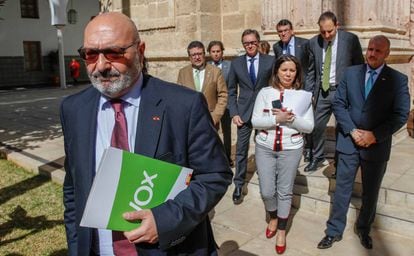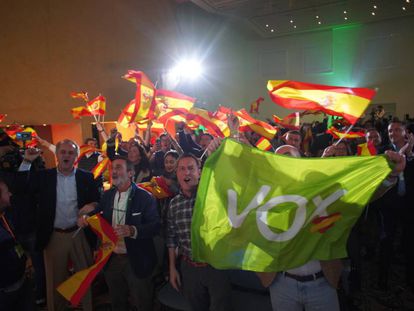Spain’s Vox gets nearly €3m in public funds despite tough talk on subsidies
The far-right party had campaigned for cuts to government funding, but benefits from substantial aid now that it has 12 seats in the Andalusian parliament


Following its strong performance at the Andalusian elections in December 2018, Spain’s far-right party Vox now has a presence in the regional parliament, which also comes with access to public funds for the party and salaries for its 12 deputies.
This combined income comes out to just over €2.9 million, of which 98% represents public subsidies for election expenses (nearly €1.7 million) and annual allocations to help political groups with parliamentary representation carry out their duties (approximately €1.2 million).
Yet one of Vox’s signature campaign issues was eliminating government funding for political parties. In the initial document that Vox put to the right-wing Popular Party (PP) as a condition for backing the PP’s Juan Manuel Moreno as the new regional premier, there was a call to reduce public funding for political groups, unions and business associations by as much as 75%.
This point was eventually dropped from the final deal that ousted the Socialist Party (PSOE) from power in Andalusia after 36 years of uninterrupted government. And Vox’s representatives in the region have not taken any steps to reject the funds, arguing that there are bigger priorities to deal with, and that such a move should be agreed to by all political groups in the chamber.
According to election regulations passed in October 2018, every party can receive €23,035 for each one of its seats plus €0.85 for each vote obtained. Vox secured 393,201 votes at the December poll, raising its election-related funds to €610,640.85. But the party also gets additional subsidies to cover the expense of sending out voting ballots and envelopes; this amount depends on the number of party voters as a percentage of the total electorate. Since Vox obtained 10.92% of the votes, this means €0.1648 per voter. And since election officials place the voter body at 6,541,748 people, this means an additional €1,078,080 to cover election expenses.
To this must be added more regional funds to help with the daily running of affairs in parliament and to pay outside advisors. Out of the global figure of nearly €10.7 million earmarked for all political parties in parliament, Vox gets close to €1.2 million. The use of this money is audited by parliament, and any leftover amounts must be returned. Vox has hired eight advisors who include lawyers, economists and press managers, said party sources.

Meanwhile, each regional representative gets a salary of €3,127.22 a month, plus extra money for holding positions in committees or for being a party spokesperson. There are also allowances for travel expenses ranging between €200 and €500 a month. Vox representatives have no obligation to give part of their deputy income to the party.
According to these parameters, Vox’s best-paid representative is its parliamentary spokesman, Alejandro Hernández, who earns nearly the same as the regional premier Juan Manuel Moreno (who makes €5,519 a month, not counting allowances). The Andalusian premier earns the next-to-lowest salary in Spain, after the head of the small northern region of Cantabria.
English version by Susana Urra.












































